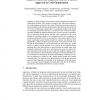Free Online Productivity Tools
i2Speak
i2Symbol
i2OCR
iTex2Img
iWeb2Print
iWeb2Shot
i2Type
iPdf2Split
iPdf2Merge
i2Bopomofo
i2Arabic
i2Style
i2Image
i2PDF
iLatex2Rtf
Sci2ools
114
click to vote
LCPC
2005
Springer
2005
Springer
Analytic Models and Empirical Search: A Hybrid Approach to Code Optimization
Compilers employ system models, sometimes implicitly, to make code optimization decisions. These models are analytic; they reflect their implementor’s understanding and beliefs of the system. While their decisions can be made almost instantaneously, unless the model is perfect their decisions may be flawed. To avoid exercising unique characteristics of a particular machine, such models are necessarily general and conservative. An alternative is to construct an empirical model. Building an empirical model involves extensive search of a parameter space to determine optimal settings. But this search is performed on the actual machine on which the compiler is to be deployed so that, once constructed, its decisions automatically reflect any eccentricities of the target system. Unfortunately, constructing accurate empirical models is expensive and, therefore, their applicability is limited to library generators such as ATLAS and FFTW. Here the high up-front installation cost can amortiz...
Related Content
| Added | 28 Jun 2010 |
| Updated | 28 Jun 2010 |
| Type | Conference |
| Year | 2005 |
| Where | LCPC |
| Authors | Arkady Epshteyn, María Jesús Garzarán, Gerald DeJong, David A. Padua, Gang Ren, Xiaoming Li, Kamen Yotov, Keshav Pingali |
Comments (0)

